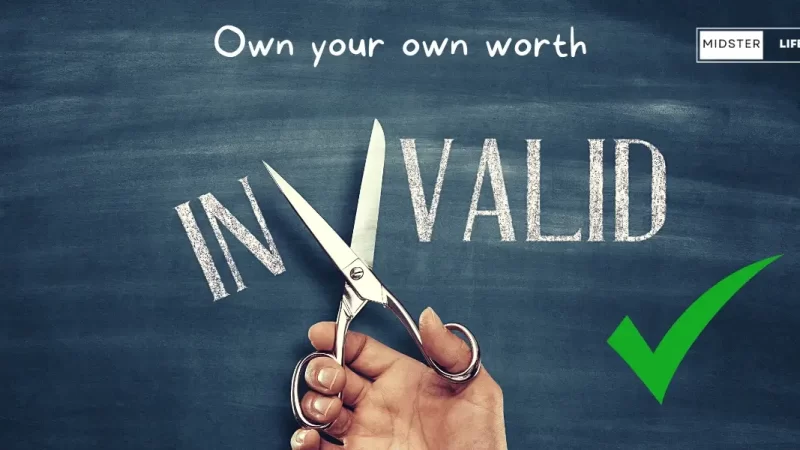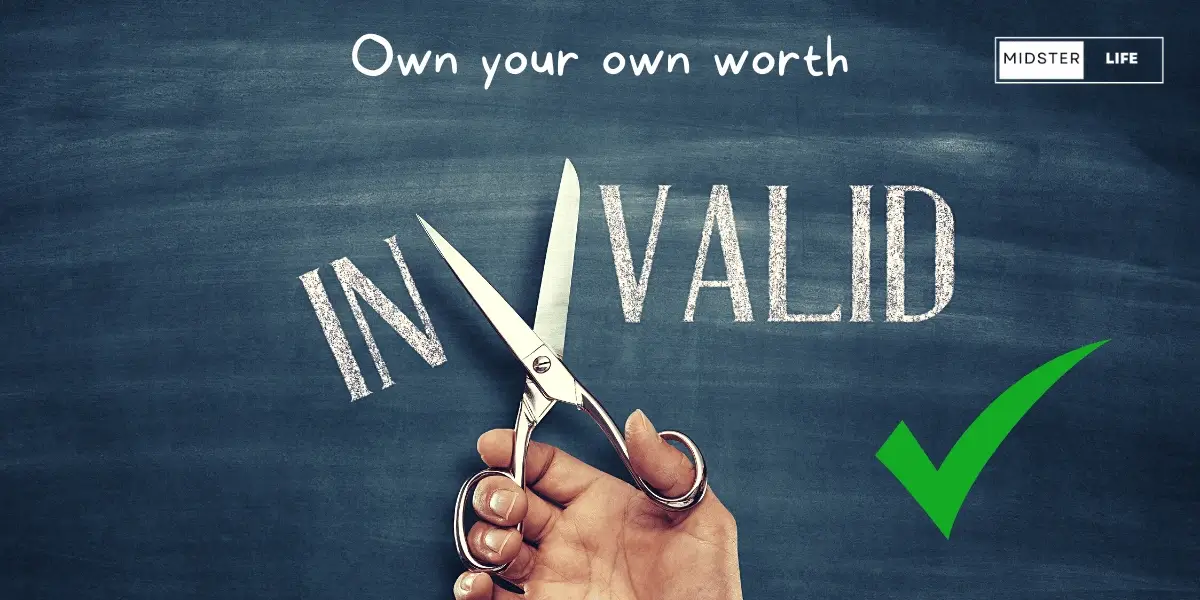Own Your Worth: Strategies to Stop Seeking Validation from Others
You’ve not long started a new job.
You’re keen to impress and make your mark and volunteer to be part of a big and exciting project. After some long hours over a couple of weeks, your team has devised a proposal.
Everyone is excited. It’s innovative and will make an impact…at least, you think it will.
The thing is, you’ve spotted a problem. The project lead may have made a mistake. You know you should speak up, but you’re not sure.
A feeling of uncertainty comes over you and makes you doubt yourself.
“What if I’m wrong?”
You don’t want to look stupid.
You don’t want to upset anyone.
You don’t want a confrontation.
You want validation from your colleagues and to feel part of the team; you want to avoid risking that at this early stage.
You stay quiet.
At home that night, you lay in bed, frustrated with yourself. “Why am I like this?”
“Why do I need this validation from others?”
In this article, we will explore why despite being in your 40s, you may still be seeking validation from others and the potential negative consequences that can arise from this behavior.
We will also offer tips and strategies for developing a healthier sense of self-worth and self-validation. Your 40s can be the decade you break free from the cycle of seeking external validation and start living a more fulfilling and authentic life.
What is external validation?
In human behavior and psychology, external validation refers to seeking approval, recognition, or validation from others to feel good about yourself or to reinforce your self-worth. It is a form of social proof where others reinforce an individual’s beliefs, actions, or feelings.
External validation-seeking behavior can manifest in different ways, such as seeking validation through social media likes and comments, approval from authority figures, or reassurance from others.
As social beings, we naturally seek validation and approval from those around us. In most cases, it’s a helpful mechanism to build connections, get feedback, and create a sense of belonging.
Why validation from others is important
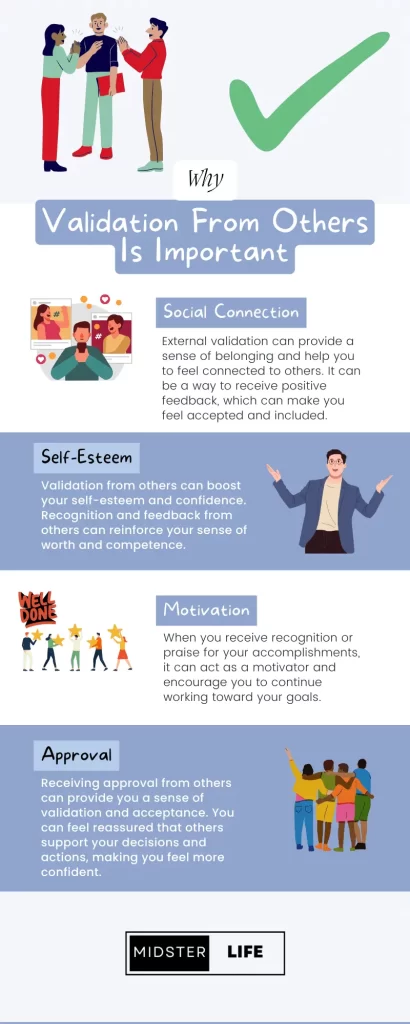
Validation from others is a fundamental human need that can significantly impact our sense of self-worth, emotional well-being, and motivation. Some of the reasons why external validation is important include the following:
- Social Connection: Being social creatures, humans need social connections. External validation can make us feel a sense of belonging, helping us to connect with others. When we receive positive feedback from others, it can lead to a feeling of acceptance and inclusion.
- Self-Esteem: Validation from others can boost our self-esteem and confidence. When others provide positive feedback or recognition, it reinforces our sense of self-worth and competence.
- Motivation: External validation can motivate us to do better. When we receive recognition or praise for our accomplishments, it encourages us to keep working towards our goals and aspirations.
- Approval: Seeking approval from others can make us feel validated and accepted. It’s reassuring to know that others support our decisions and actions, which in turn helps us feel more confident in our choices.
However, relying solely on external validation can have negative consequences. It can lead to feelings of insecurity and dependence on others for validation, which can harm our mental health and overall well-being. It’s important for individuals to also develop a sense of self-worth and self-validation from within.
The downsides of seeking validation from others
However, research has found that individuals who rely heavily on external validation are more likely to experience symptoms of depression and anxiety. It can become problematic when an individual’s sense of self-worth becomes dependent on external validation, leading to feelings of inadequacy or anxiety when that validation is not received.
Another study found that relying on external validation can lead to lower levels of intrinsic motivation. As a result, individuals may be less likely to pursue goals and interests as they focus more on pleasing others.
While some degree of external validation can help boost self-esteem and provide motivation, relying solely on it for self-worth can harm your mental health and well-being.
Why do I need validation from others?
Humans are social creatures, and we rely on feedback from others to help us understand our place in society. However, the importance of validation can vary from person to person and can depend on factors such as personality, upbringing, and cultural background.
People look for validation from others for various reasons, including:
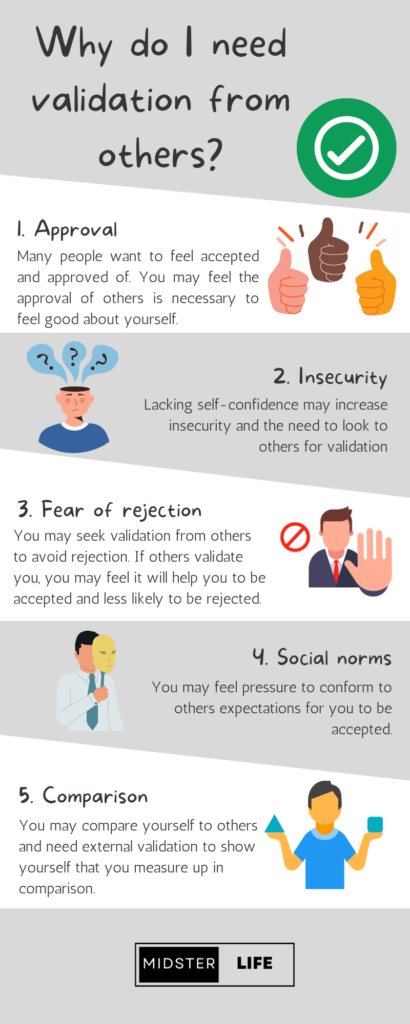
Validation from others is something many seek for a variety of reasons:
- Approval: Seeking validation is often rooted in a desire to be accepted and approved by others. This is especially true for those who feel their self-worth is tied to the approval of others.
- Insecurity: A lack of self-confidence can lead people to seek validation from others to feel better about themselves.
- Fear of rejection: Seeking validation from others can be a way to avoid rejection. Those who feel validated by others are often more likely to be accepted and less likely to be rejected.
- Social norms: Conforming to societal expectations is a common reason people seek validation from others. The pressure to meet certain standards or expectations can drive this need for validation.
- Comparison: Comparing oneself to others can also lead to a desire for validation. People often feel they need to measure up to certain standards or achievements to feel good about themselves.
How to stop seeking validation from others
While external validation can be beneficial in many ways, it is vital for individuals to also develop a sense of self-worth and self-validation from within.
Stopping seeking validation from others can be challenging, especially when over 40. Many years of repeated behaviors have built ingrained habits that can be difficult to break.
But here are some steps you can take to stop seeking validation and learn to validate yourself:
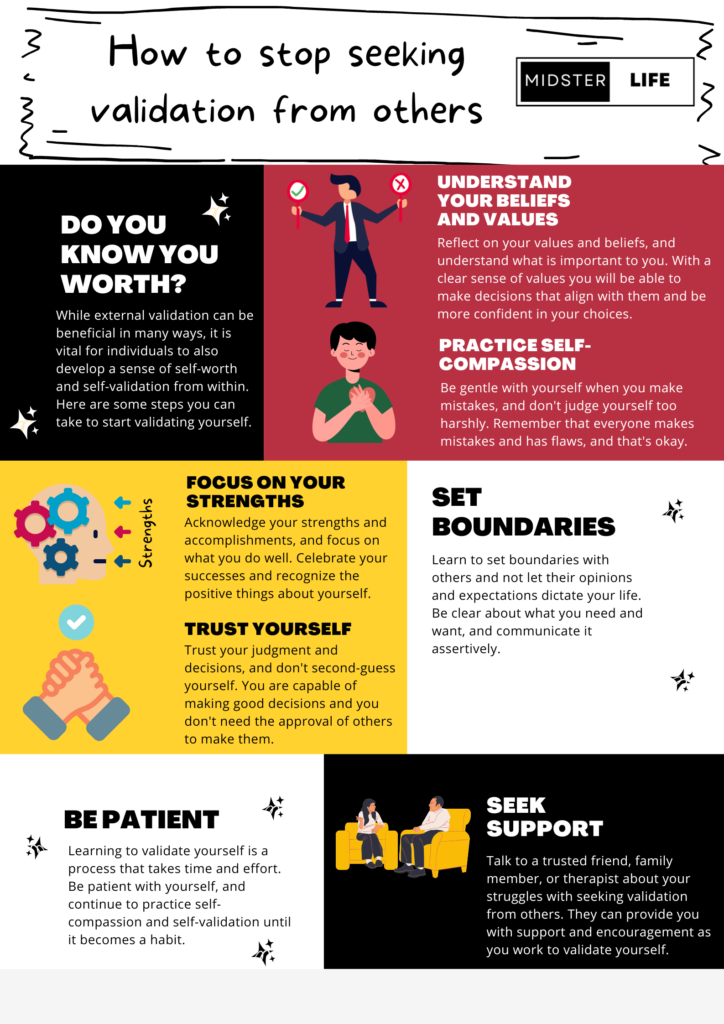
Self-validation can be a challenging process, but here are some steps that can help:
- Clarify your values and beliefs: Take some time to reflect on your values and beliefs, and gain a clear understanding of what truly matters to you. This will allow you to make decisions that align with your values and give you confidence in your choices.
- Be kind to yourself: Treat yourself with kindness and compassion. When you make mistakes, be gentle with yourself and avoid judging yourself too harshly. Remember, everyone has flaws and makes mistakes.
- Recognize your strengths: Acknowledge your strengths and accomplishments, and focus on what you do well. Celebrate your successes and remind yourself of the positive things about yourself.
- Trust your judgment: Trust your decision-making skills and avoid second-guessing yourself. You can make good decisions without relying on the approval of others.
- Set boundaries: Learn to set boundaries with others and avoid letting their opinions and expectations control your life. Clearly communicate your needs and wants in a respectful and assertive manner.
- Seek support: Talk to a trusted friend, family member, or therapist about your struggles with seeking validation from others. They can provide you with support and encouragement as you work towards validating yourself.
Learning to validate yourself is a process that takes time and effort. Be patient with yourself, and continue to practice self-compassion and self-validation until it becomes a habit.
What are the benefits of stopping seeking validation from others?
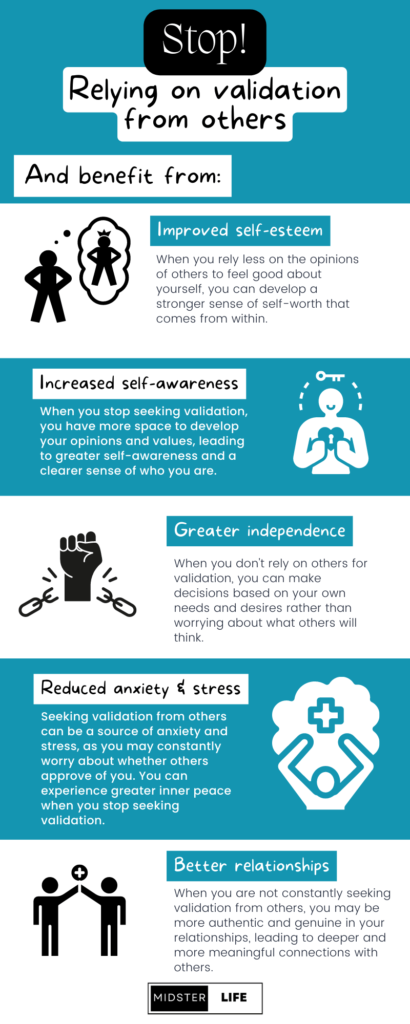
So by taking the first steps to quit seeking validation from others, you will start seeing the benefits of self-validation.
These include:
- Enhanced self-esteem: When you rely less on external opinions to feel good about yourself, you develop a stronger sense of self-worth that comes from within, ultimately leading to improved self-esteem.
- Increased self-awareness: By not seeking validation, you create space to develop your opinions and values, leading to greater self-awareness and a clearer sense of your identity.
- Greater independence: When you do not depend on others for validation, you are better equipped to make decisions based on your own needs and desires rather than worrying about what others might think.
- Reduced anxiety and stress: Seeking validation from others can be a source of anxiety and stress, as you may constantly worry about whether others approve of you. By not seeking validation, you can experience a greater sense of inner peace, ultimately reducing anxiety and stress levels.
- Improved relationships: When you are not constantly seeking validation from others, you can be more authentic and genuine in your relationships, leading to deeper and more meaningful connections.
Learning to validate yourself can lead to greater self-awareness, self-confidence, and happiness. Why not use the transformative decade of your 40s to improve your self-validation, build stronger relationships, and make better decisions that align with your values and desires?
Start your journey today to overcome reliance on validation from others and move toward a more confident and self-assured you.
Not sure where to start? Try 10 ways to make positive changes in your 40s and see what you can change today to make your 40s a transformative decade.

